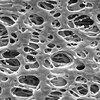Paternal and maternal genomes confer opposite effects on proliferation, cell-cycle length, senescence, and tumor formation.
Hernandez, Lidia, et al.
Proc. Natl. Acad. Sci. U.S.A., 100: 13344-9 (2003)
2003
Show Abstract
Loss of imprinting is the silencing of active imprinted genes or the activation of silent imprinted genes, and it is one of the most common epigenetic changes associated with the development of a wide variety of tumors. Here, we have analyzed the effects that global imprinted gene expression has on cell proliferation and transformation. Primary mouse embryonic fibroblasts (MEFs), whose entire genome is either exclusively paternal (androgenetic) or maternal (parthenogenetic), exhibit dramatically contrasting patterns of growth. In comparison with biparental MEFs, andro-genetic proliferation is characterized by a shorter cell cycle, increased saturation density, spontaneous transformation, and formation of tumors at low passage number. Parthenogenetic MEFs reach a lower saturation density, senesce, and die. The maternally expressed imprinted genes p57kip2 and M6P/Igf2r retard proliferation and reduce the long-term growth of MEFs. In contrast, the paternally expressed growth factor Igf2 is essential for the long-term proliferation of all genotypes. Increased Igf2 expression in primary MEFs not only stimulates proliferation, but also results in their rapid conversion to malignancy with tumor formation of short latency. Our results reveal that paternally expressed imprinted genes, in the absence of maternal imprinted genes, predispose fibroblasts to rapid transformation. A potent factor in their transformation is IGF2, which on increased expression results in the rapid conversion of primary cells to malignancy. These results reveal a route by which malignant choriocarcinoma may arise from molar pregnancies. They also suggest that the derivation of stem cells from parthenogenetic embryos, for the purposes of therapeutic cloning, may be ineffective. | 14581617
 |
Challenging cytokine redundancy: inflammatory cell movement and clinical course of experimental autoimmune encephalomyelitis are normal in lymphotoxin-deficient, but not tumor necrosis factor-deficient, mice.
Sean Riminton, D, et al.
J. Exp. Med., 187: 1517-28 (1998)
1998
Show Abstract
Lymphotoxin (LT) is widely regarded as a proinflammatory cytokine with activities equivalent to tumor necrosis factor (TNF). The contribution of LT to experimental autoimmune encephalomyelitis (EAE) was examined using TNF/LTalpha-/- mice, TNF-/- mice, and a new LTalpha-/- line described here. All mice were generated directly in the C57BL/6 strain and used for the preparation of radiation bone marrow chimeras to reconstitute peripheral lymphoid organs and restore immunocompetence. This approach overcame the problems related to the lack of lymph nodes that results from LTalpha gene targeting. We show here that when LT is absent but TNF is present, EAE progresses normally. In contrast, when TNF is absent but LT is present, EAE is delayed in onset and inflammatory leukocytes fail to move normally into the central nervous system parenchyma, even at the peak of disease. In the absence of both cytokines, the clinical and histological picture is identical to that seen when TNF alone is deficient, including demyelination. Furthermore, the therapeutic inhibition of TNF and LTalpha with soluble TNF receptor in unmanipulated wild-type or TNF-/- mice exactly reproduces these outcomes. We conclude from these studies that TNF and LT are functionally distinct cytokines in vivo, and despite sharing common receptors, show no redundancy of function nor mutual compensation. | 9565643
 |













